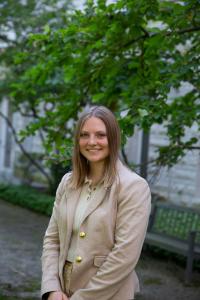You are here
Lucy Corthell
Juniata College
APS Education & Diversity Intern
American Physical Society
Final presentation
![]() Lucy Corthell - Final Presentation 2022.pdf
Lucy Corthell - Final Presentation 2022.pdf
Inequities in higher education are excluding individuals with marginalized identities from Physics and other STEM fields. To understand where these gaps are, I collected and analyzed data on physics and STEM graduation rates at US colleges and Universities from the Integrated Postsecondary Education Data System (IPEDS). IPEDS is a system of interrelated surveys conducted annually by the U.S. Department of Education's National Center for Education Statistics (NCES). The data I collected showed that there continues to be disparities between demographic groups which are a result of the systemic barriers and challenges faced by marginalized individuals. To work towards a more equitable environment, we need to recognize and challenge the cultural and structural barriers and bring more marginalized voices to the table. However, this alone will not mend inequity issues. Marginalized groups must feel accepted and share an equal amount of power to begin to close the gaps in higher education spaces. I hope the statistics and graphs I have collected will drive conversation around how to better support a community where all voices are equitably represented in Physics and STEM.
Hello everyone, I am the Education and Diversity Statistics Intern this summer at APS and a rising junior at Juniata College studying Engineering Physics with a minor in Peace and Conflict Studies. I am from Seattle, Washington and I have an ardent desire to help encourage other marginalized populations in physics and STEM to feel welcome and included.
To work towards a more equitable environment, I think we need to recognize and challenge the cultural and structural barriers and bring more marginalized voices to the table. However, this alone will not mend inequity issues. Marginalized groups must feel accepted and share an equal amount of power to begin to close the gaps in higher education. I hope the work I do this summer on updating graphs and making statistics more available will fuel conversation around how to better support a community where all voices are represented to drive change.
My passions are in the intersection between engineering physics, social justice, and sustainability! Last summer I did research at the National Renewable Energy Laboratory where I was fortunate to work with Sika Gadzanku and Eric Lockhart. There, I was able to explore my passions in green energy and energy equity which is a big reason why I am so ecstatic to learn more about diversity and education through this internship. I hope to follow my passions in engineering physics and sustainability to help make our transition to clean energy by 2035 an equitable one.
At Juniata, I am very involved with our SPS Chapter and the physics community. The physics community is always there for each other and has helped me adjust to college and figure out what careers are available. I also appreciate SPS and ΣΠΣ’s commitment to Diversity, Inclusion, Ethics, and Responsibility. Besides SPS, I have held leadership positions in Women in Physics, Juniata Environmental Coalition, and Peace and Conflict Studies club among others.
I am very thankful to SPS, and I am looking forward to working with Christine O’Donnell at APS this summer.

